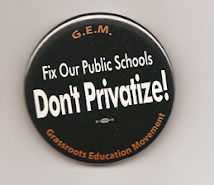 An easy-to-read article by Daniel Wolff in Counterpunch starts off with a quote by the CEO of a real-estate trust who sunk many millions of dollars into charter schools:
An easy-to-read article by Daniel Wolff in Counterpunch starts off with a quote by the CEO of a real-estate trust who sunk many millions of dollars into charter schools:"We’re not speculators. We’re investors.”That's frightening, particularly when you think that BushBama has been pushing the charter school agenda for a decade. What's good about this article is that it describes the relationship between a number of charter school components that not everyone fully understands:
Essentially, Wolff says, "Charters are public schools in that the funding comes from state and local school taxes. [The school] gets a certain amount of money for each of its charter students based on the home district’s per-student expenses. The more kids [it] enrolls, the more money it gets (and the less goes to traditional public schools.) . . . The money pays for teachers, supplies, maintenance, etc. But the problem charter schools have is getting the capital to buy or lease buildings [italics mine]."
Where has New York City seen that before?
EVERYWHERE, in every borough. That's why charters are being allowed to push out public schools from their own buildings, and that's why we're seeing "have" and "have-not" communities of children learning the fine arts of snobbism, arrogance and segregation. Our country knows a lot about these things in our sad history, and it's very unfortunate that people who make decisions for society don't particularly worry about putting that pot up to full boil again.
As you read Wolff's article, pieces of info you've picked up from this or that school-specific situation fall into place.
After some explanatory paragraphs about how real-estate speculators make money off the charter school business, Wolff posits that "the only catch in the formula is the charter has to educate its students on about half what the state spends per-student." Quoting from one charter school website, he says:
The corporation demands what it calls “economic sustainability” from all its schools. “Each school must spend less each year on school operations than it receives in revenue from the government and other sources.”He then asks the question:
But if the district determines how much it costs to educate a child — and sends money to [the charter] based on that formula — how can the charter school do it for less?The answer he got from a principal: "Money was saved by letting go veteran (read expensive) teachers and increasing class size (read cost saving)."
The charter school Wolff's talking about went onto the national Watch List for failing schools, and the conclusion he was able to draw was that "the rent got paid. But it didn’t guarantee the quality of the education."
That charter is run by Imagine in Nevada, the same company that operates the Imagine Bronx Academy of Promise right here in the Bronx.
— jw









1 comment:
Charter schools are no bargain.
http://seattle-ed.blogspot.com/
Post a Comment